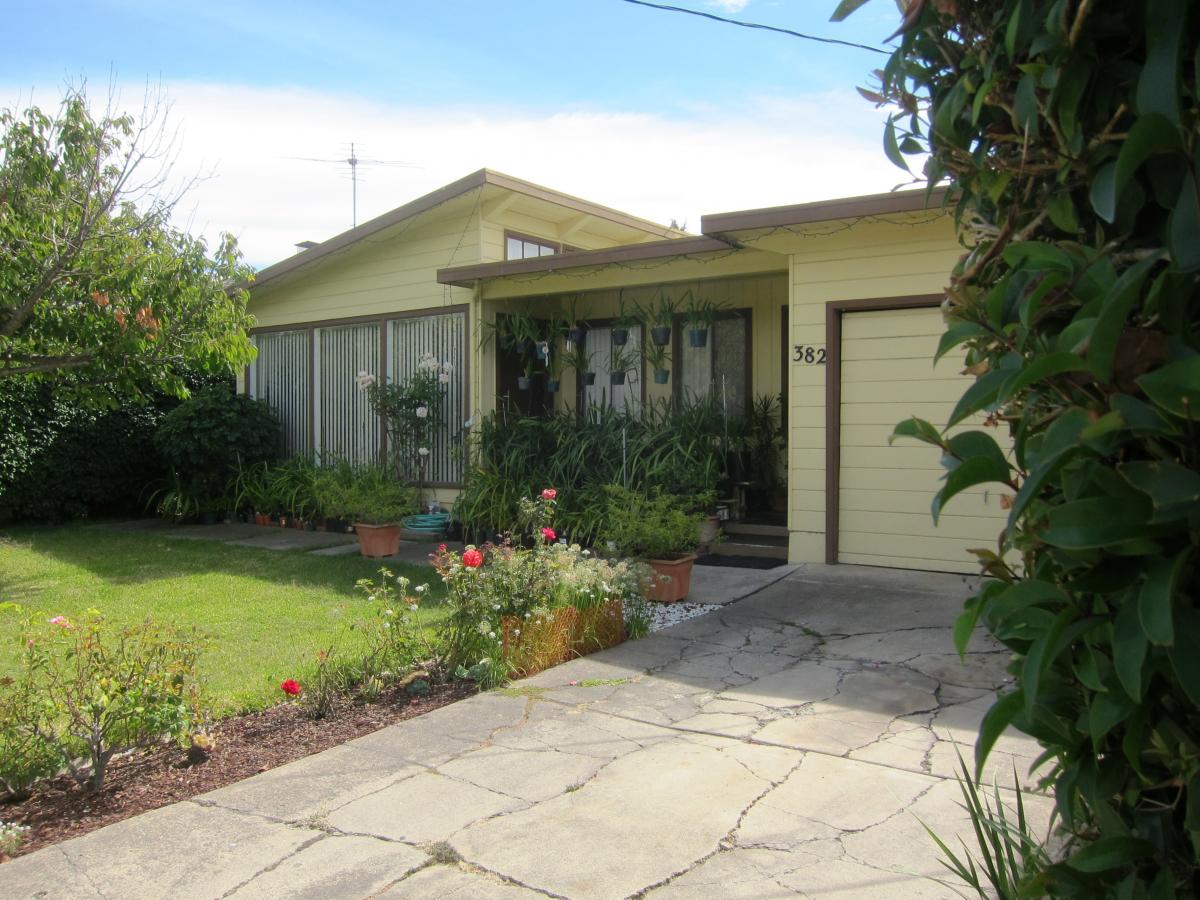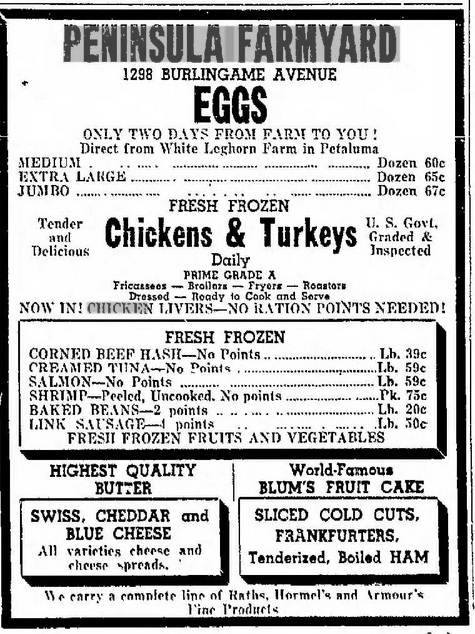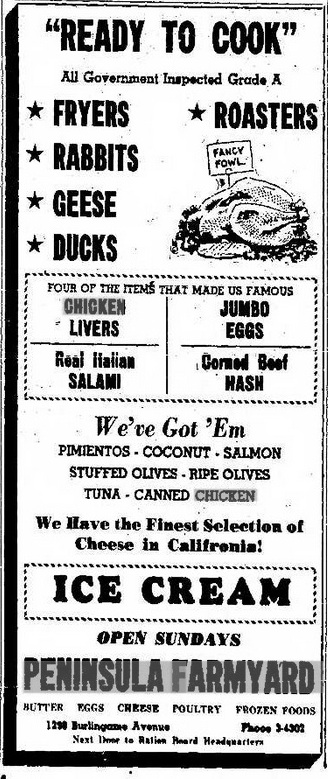
When Joe Eichler Ran a Farmyard
 |
|
|
Retail had always been in Joe Eichler’s blood. He grew up on Manhattan’s East Side, in and around Sutton Place, where his father and mother ran a small toy store. They did well enough at it to employ a live-in maid.
Joe always retained fond memories of the shop, his son, the late Ned Eichler, recounted in a series of interviews some years back.
Joe told of his mother selling illegal firecrackers to neighborhood kids from a stash concealed in her apron. “Joe told this story with a lot of joy,” Ned recalled.
So it’s not surprising that Joe, after coming to the Bay Area, opened a store himself and ran it for several years while he searched for a more satisfying, more demanding profession. That store was called the Peninsula Farmyard, occupying a storefront not far from the train station in downtown Burlingame, at 1298 Burlingame Avenue.
Joe’s Peninsula Farmyard sold “fryers, rabbits, geese, ducks, roasters,” “real Italian salami,” and “the finest selection of cheese in California,” according to a 1943 ad.
(Maybe Joe noticed the ad running next to his in the San Mateo Times that day – builder Henry Doelger pushing his Mayfair Village subdivision.)
 |
|
|
Other ads in the San Mateo Times brag of “four of the items that made us famous,” chicken livers, jumbo eggs, “real Italian salami,” and corned beef hash. Pimentos, stuffed olives, and coconut were other available treats.
Joe bragged about how fresh his produce was, bringing in eggs from Petaluma. “Only two days from farm to you,” the ad copy read.
Throughout the time Joe ran Peninsula Farmyard he was living first in a traditional, Spanish-tinged, Monterey-styled home in San Mateo near the Hillsborough city limit. Joe and wife Lillian lived with their two sons, Ned and Dick, and with live-in help.
The second home the family inhabited during this time was the famous Frank Lloyd Wright-designed Bazett house in Hillsborough, where Joe fell in love with modern architecture and which inspired him, in 1947, to go into the homebuilding business.
It’s not surprising that when Joe opened a store, it should specialize in poultry and eggs. For almost his entire career he had been working, and continued to work through World War II, as treasurer and then chief operating officer for Nye & Nissen, a poultry and egg wholesaler run by his father in-law.
This was a West Coast firm that the father in-law, Abe Moncharsh, had invested in from his home in New York. Moncharsh took it over when it encountered financial problems.
Moncharsh moved to California at that time, the mid-1920s, and Joe and Lillian followed. The firm was located in San Francisco, near what is today the Embarcadero Center but was then the city’s produce mart.
 |
|
|
Joe grew increasingly frustrated with his career during the 1940s, Ned has said. He was casting around for a business of his own, something he had always wanted. But even in the poultry business, Joe was creative.
“He added to the business something modern and new, a new product that was frozen chickens,” Ned said.
Just as Nye & Nissen was a family-run firm – Joe’s brother Abe, who went by 'Al,' was also involved – so was Peninsula Farmyard.
Ned recalled working in the store on weekends when he was about 12 years old – which would have been 1942. It was war time and food was rationed. “Shop early because of heavy demand for poultry,” one Peninsula Farmyard ad advised.
In one ad, the copy said, “Now in – chicken livers. No ration points needed.”
But Ned recalled when butter was indeed rationed – but Joe had plenty. “There was a big line of people outside the store,” Ned recalled.
Meanwhile, Nye & Nissen was penalized by the government for selling either outdated eggs or those that did not meet their stated grade. They were caught when food inspectors 'candled' the eggs, checking quality by holding them alongside a candle.
Ned said the scheme was Abe’s idea, and it was something Joe had tried to avoid. Abe served between six months and a year in jail. “It absolutely shattered him emotionally,” Ned recalled.
Nye & Nissen was sold in 1945. Joe continued to run Peninsula Farmyard until 1946 – shortly after the Eichlers were forced out of their rental at the Bazett house.
Joe began looking into home building, as many entrepreneurial men were doing as World War II was coming to a close. Everyone knew that as GIs returned, married, and formed long-deferred families, they would need homes.
Suburbia was around the corner.
A San Mateo Times ad for on October 3, 1946 said Peninsula Farmyard “announces new ownership and an opportunity to bring you new delicacies.” It was bye-bye, delicatessen—hello, Eichler homes.
- ‹ previous
- 633 of 677
- next ›



